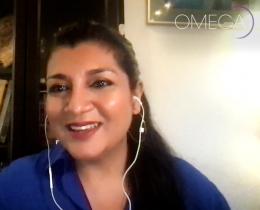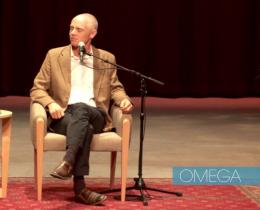Omega: You are an expert in building resilience and nurturing self-love. Can you tell us, what you do when you feel overwhelmed or discouraged?
Dr. 1Dreah: Like everyone else, I too have moments when I feel overwhelmed, discouraged, or find myself caught in a web of negative self-talk. Being a physician and therapist doesn't make me immune to these human experiences. But over time, I've developed strategies that help me navigate these rough patches with resilience and grace.
When I find myself in the midst of emotional turmoil, the first step I take is to practice mindfulness. I try to stay present, acknowledging my feelings without judgment. It’s not about dismissing my emotions, but observing them without letting them control me.
Next, I turn to my breath as a lifeline. I take deep, conscious breaths, a simple yet incredibly potent practice that soothes my nervous system and helps me shift from a state of stress to one of relaxation.
When negative self-talk sneaks in, I remind myself that my thoughts are not facts. They're just thoughts, and they are within my power to change. I use affirmations as a powerful tool to challenge and change my thought patterns. So, instead of thinking, "I can't do this," I tell myself, "I am capable and strong. I can handle anything that comes my way."
I also make it a point to practice self-compassion. I remind myself to be gentle and understanding with myself, just as I would be with a dear friend. After all, I am doing the best I can, and that's enough.
And finally, I remember that each of these challenging moments is an opportunity for me to build my resilience muscle. Each time I navigate through a difficult situation, I emerge stronger, better equipped to face future challenges.
Omega: Do we all have an inner critic? How do you help your clients cope with negative self-talk?
Dr. 1Dreah: Yes, as humans, we all have that voice inside our heads that tends to focus on our perceived flaws and mistakes. This is largely a result of our brains' negativity bias, a survival mechanism designed to keep us safe by alerting us to potential threats or mistakes.
The inner critic isn't something we are born with. It's a voice that gets 'installed' or internalized over time due to various external influences and experiences.
When we're young, we're like sponges, absorbing information and cues from our surroundings to help us understand and navigate the world. This includes the attitudes, beliefs, and expectations of the people around us, especially significant adults like our parents or coaches, or even peers such as schoolmates or the playground bully.
If these individuals are overly critical, harsh, or set unreasonably high standards, we can internalize these messages and they become a part of our self-perception. For instance, if a parent often criticized a child for making mistakes, the child might grow up with an inner critic that constantly fears failure and criticizes every small error. Or, if a child was frequently bullied at school and called names, they may internalize those hurtful words and their inner critic echoes those insults, leading to low self-esteem.
So, the inner critic is essentially a learned voice. But the good news is, just as it was learned, it can be unlearned. With compassion, awareness, and intentional practice, we can reprogram the inner critic, replacing its harsh judgments with supportive and self-compassionate narratives. Through methods such as the Cornerstone Process, we can reclaim our authentic voice and nurture a loving relationship with ourselves.
In my work, I help clients cope with their inner critic by using a three-step approach:
- Awareness: First, I guide my clients to recognize when their inner critic is speaking. This involves learning to differentiate between the voice of the inner critic and their authentic voice. It's about identifying patterns of negative self-talk and understanding the situations that tend to trigger it.
- Compassion and Understanding: Once we've identified the inner critic, the next step is to approach it with compassion and understanding. It's important to remember that the inner critic is not an enemy. It's a part of us that's trying to protect us, albeit in a misguided way. When we identify where it got installed and why, it can be easier to face it with compassion. Then, we learn to thank it for its intentions and then reassure it—and ourselves—that we are capable and deserving of love and success.
- Reframing: The final step is to reframe the inner critic's narrative. This involves challenging and replacing negative self-talk with positive affirmations and self-compassionate language. By doing this, we change the inner dialogue, transforming the inner critic into a supportive ally.
Remember, it's a process that takes time and practice, and it's okay to seek help.
Omega: You mention the Cornerstone Process. How does this process work in developing self-love?
Dr. 1Dreah: The Cornerstone Process is a five-step framework designed to guide you on a journey of self-discovery, healing, and life mastery. I first offered it to my patients who were recovering from burnout and detoxing from substance abuse. The framework includes these steps: awareness, acceptance, aligning the mind with higher consciousness, inspired action, and appreciation. It's not a 'quick fix.' It helps you reconnect with your essential being and reclaim authority over your life.
Cultivating self-love daily isn't an act of vanity or selfishness; it's an act of self-preservation.
Omega: What is burnout? Can you tell a story about your experience with burnout, and how you addressed it?
Dr. 1Dreah: Burnout, in essence, is a state of emotional, physical, and mental exhaustion that's caused by excessive and prolonged stress and overwork. It's often characterized by feelings of overwhelming fatigue, cynicism, detachment, and a sense of inefficacy. However, it's important to understand that burnout isn't just about overworking; it's also deeply connected to certain personality traits.
Many people who experience burnout, including myself, struggle with traits like codependency. We're the ones who find it hard to say 'no', who constantly put others' needs before our own. We're the ones who tend to derive our self-worth from external validation, from our ability to do and be more.
In my own journey with burnout, I was driven by a compulsive need to prove myself, an urge that stemmed from growing up with critical parents. No matter how much I achieved, no matter how hard I worked, it never felt enough. Despite my accomplishments, my self-esteem remained low, because my inner critic kept moving the goalposts, pushing me to do more, to be more.
Addressing my burnout involved recognizing these underlying issues. The Cornerstone Process was instrumental in my recovery. I had to learn to listen to my body and mind when they signaled that I was pushing too hard. I had to learn to set boundaries, to understand that it's okay to say 'no', that I don't have to be everything for everyone.
If you're experiencing burnout, you're not alone. And it's not a sign of weakness, it’s a sign that you’ve been too strong for too long! It's okay to ask for help, to take a step back, to prioritize your own well-being.



